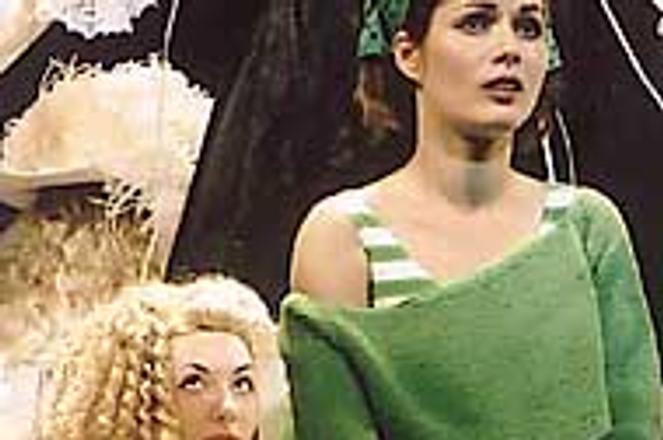JOLANA Fogašová as Angelina.photo: Courtesy of SND
La Cenerentola
Composed by: Gioacchino Rossini
Conducted by: Dušan Štefánek, Martin Mázik
Where: Slovenské národné divadlo (Slovak National Theatre), Hviezdoslavovo námestie, Bratislava
Next performances: April 28, May 20, June 23
Performed in two acts, in Italian with Slovak subtitles
Rating: 9.5 out of 10
KNOWN and loved by children and adults all over the world for centuries, the story of Cinderella lives on - and not just in books. Many librettists and composers have incorporated the story into their works, in their own ways, often causing sensations.
Slovak stage director Jozef Bednárik is no exception. His Cinderella, which appeared on the Slovak opera stage March 7, immediately caused some controversy.
No wonder. The director set the ancient fairy tale in modern surroundings where brave knights are riding fitness machines, beautiful maidens are wearing sporty, sexy outfits, and the most powerful magician is sipping Coca-Cola. Serious and critically minded? Please abstain - this production is strictly for those who have a sense of humour and playfulness.
Before the premiere of Gioacchino Rossini's famous version of Cinderella (La Cenerentola) in 1817, the story had been staged at least three times: as a vaudeville, a comic opera, and a grand opera. For his creation, Rossini chose the "dramma giocoso" - joyful drama - genre, which gave him the freedom to mix elements of comic and dramatic theatre.
Even though Rossini - the creator of 19 operas by the age of 24 - wrote La Cenerentola in 24 days, to write for the Italian opera two centuries ago was not an easy task. Severe censorship would not allow any frivolity, the technical equipment was often faulty, and the stage was dominated by singers who competed with each other. As such, Rossini eliminated any magical or ambiguous moments from his opera, and created extended and brilliant arias and ensembles to fit the requirements of the singers and the public.
To avoid any frivolity, Rossini exchanged the glass slipper that helps the prince find his bride for a couple of bracelets. For a better balance of male and female voices, he replaced the wicked stepmother from the original fairy tale with a stepfather, Don Magnifico, and instead of the fairy godmother there is a teacher, Alidoro, to help the main characters overcome their obstacles.
Rossini was known for his outstanding sense of humour. The Slovak team of the stage director Jozef Bednárik, set designer Vladimír Čáp, and costume designer Ľudmila Várossová, prove they have plenty of humour too. The famous overture of the opera is normally performed in front of closed curtains with no singers in sight. This time, the curtains pull open, unveiling the inside of the fitness centre Palazzo Magnifico.
It is early morning, and Cinderella (in the opera her name is Angelina) opens the gym for business. The daughters of Don Magnifico - Tisbe and Clorinda, who are obsessed with their looks - start working out, while fitness instructor Dandini stretches his muscles.
The world of the fitness centre, and of Don Magnifico and his daughters, is one of two worlds created on the stage. It represents all aspects of vanity - greed, ego, pride, etc. The second is the palace where Prince Don Ramiro and Angelina dominate. This one is full of brightness, love, and tenderness.
For the first world, costume designer Várossová chooses green jogging outfits, and for the latter, lavish, elegant, historical costumes and enormous wigs. The singers demonstrate real miracles of fitness changing from one type of costume to the other throughout the performance. Only the magician Alidoro is exempt from this exercise, always dressed in black.
One could call this version of La Cenerentola an action opera. The music is dynamic and energetic, and the action follows the rhythm. During the two and a half hours there is a lot of movement on the stage, by which the director gives new life to the sparkling music, offsetting its repetitiveness.
The whole piece is enriched with a lot of comic and artistic details, and all the singers prove to be excellent actors and dancers. However, sometimes an excess of visual effects takes so much attention from the singers that the quality of musical performance starts suffering.
Rossini's music demands a supreme sense of rhythm and highly technical singing abilities, and the soloists János Ocsovai (Don Ramiro) and Jolana Fogašová (Angelina) create an excellent match with their bright, light, and flexible voices nicely melting together in love episodes.
Fogašová sparkles as a real star in the role of Angelina as if it were specially created for her. She performs even the most demanding coloratura arias with ease and grace. However, the rest of the cast works at the very limits of their technical capacities, but still the rhythmical precision of the performance could be improved.


